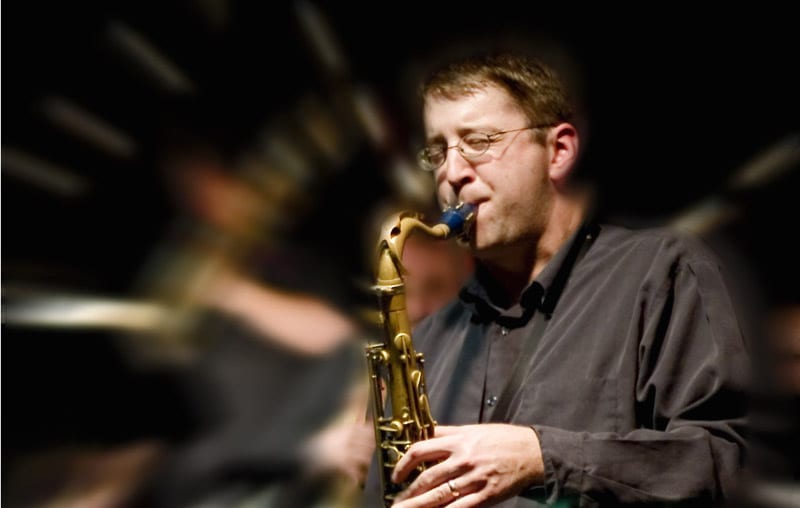“You have to relate sound to sound inside the music…. You have to try to listen to everything together. This music is good for the mind. It frees the mind. If you just listen, you find out more about yourself.”
-Albert Ayler
Perhaps the key component of a strong improvising ensemble is the chemistry that exists among its creators. For the improvising trio of saxophonist Andrew Bishop, drummer Gerald Cleaver and bassist Tim Flood—which performs tonight at the Atlas Performing Arts Center—their close, long-standing relationship provides a unique group voice, heard above the masses of similarly configured ensembles. Those familiar with the world of improvised music will immediately note all three of their names individually. They have each earned acclaim as innovators in their own rights.
Drummer Gerald Cleaver—now based in Brooklyn—is a seminal member of some of the top ensembles of that city’s venerated jazz/improvised music community, not to mention a leader of his own power ensembles (Uncle June, Black Host, the list continues). Tim Flood is a stellar bassist living in Ann Arbor, Mich., a city with a strong musical legacy. His associations include many influential musicians in the Midwest and elsewhere, including pianist Jacob Sacks and legendary saxophonist Frank Lowe. Andrew Bishop is also a fundamental part of Ann Arbor’s improvised music community. In addition to leading strong ensembles, he is also a professor of jazz and improvised music at the University of Michigan—where he’s constantly in contact with young musicians interested in improvisation.
Bishop/Cleaver/Flood have been performing together for almost two decades. Throughout that time the three have developed and honed their musical prowess as well as deepened their interpersonal relationships. At its core, this is a band of buddies, aiming for musical innovation through the exploration of collective improvisation. Using a tried and true formula, they manage to create original and compelling, moment-based music. I spoke with Andrew Bishop via email about the origins of this group and the concepts they explore.
CapitalBop: How did this ensemble Bishop/Cleaver/Flood first come together? What is your collective musical connection?
Andrew Bishop: Gerald Cleaver and I meet in 1993 when I was a graduate student in music composition at the University of Michigan. We hit it off musically right away. I started playing with Tim Flood a few years later through a mutual pianist friend Jacob Sacks. At the time I was composing a lot of concert music but wanted to continue my interests in writing in more free form idioms too so I formed the group Bishop/Cleaver/Flood in 1996. The group had an instant chemistry and I decided to keep it going at all costs—even if that meant sporadic tours and shows.
CB: Could you describe the music you will present at the Altas in D.C.?
AB: All of the players in the group are rooted in the jazz tradition, but have divergent musical interests too. The idea behind the group has always been about possibilities, jazz (or free, or, whatever) is the root of the band but almost anything can happen at anytime. The recent music we perform is actually inspired by renaissance composer Josquin Des Prez, but through a jazz and new music filter. There’s a little something for everyone I hope.
CB: What concepts do you wish to convey? What are you communicating?
AB: This band is about group dynamic. I hope people can draw on the energy of the moment.
CB: How have you navigated playing “free music” through your career?
AB: It has been a part of my musical path since I was introduced to it by a mentor of mine named Craig Owens, when I was a high-schooler in Wichita, Kan. The idea of “free” or “possibilities” or—my new favorite word to describe it—”imagination” continues to be an important part of my musical discourse, no matter what I do. I play a lot of diverse styles ranging from more traditional jazz settings to chamber music, but I always try to bring an element of “free” to all of those settings.
CB: Having the perspective of a professor, constantly being in contact with young musicians, what can you tell us about what we might expect to hear from the next generation of artists?
AB: Teaching has been and will always be an important part of my musical life. My students at the University of Michigan (and elsewhere at clinics I do) continue to challenge and inspire me on a daily basis. I believe students of today have as much, if not more, to offer artistically than any generation in history. I always stress that students need to learn skills to adapt to situations we can’t yet predict and learn to teach themselves.
CB: How do you educate students, and similarly the audience, about this music? What are some important things to remember and/or expect when experiencing improvised music?
AB: This is an ongoing question with no easy answer, I’m afraid. I continue to forge ahead and communicate to the audience whenever possible.
CB: Could you delve a little more deeply into “the moment?” Why is that the focus? What is so important about exploring “the moment?” Maybe this could give more directive into the question of how to educate listeners about improvised music.
AB: Although it is much more complicated than this, with many gray areas, largely improvisers work in the contrast of two forces: 1) practiced, readymade ideas (sometimes called “licks” by jazz musicians), and 2) the interaction with the musical context of moment to moment events. This trio strives to work more on the side of the later, though it would be naive to suggest that there aren’t moments of ready made textures. What I find most amazing about “the moment” is how much the audience impacts the music—this is want makes jazz and improvised music so great to experience live.








Join the Conversation →